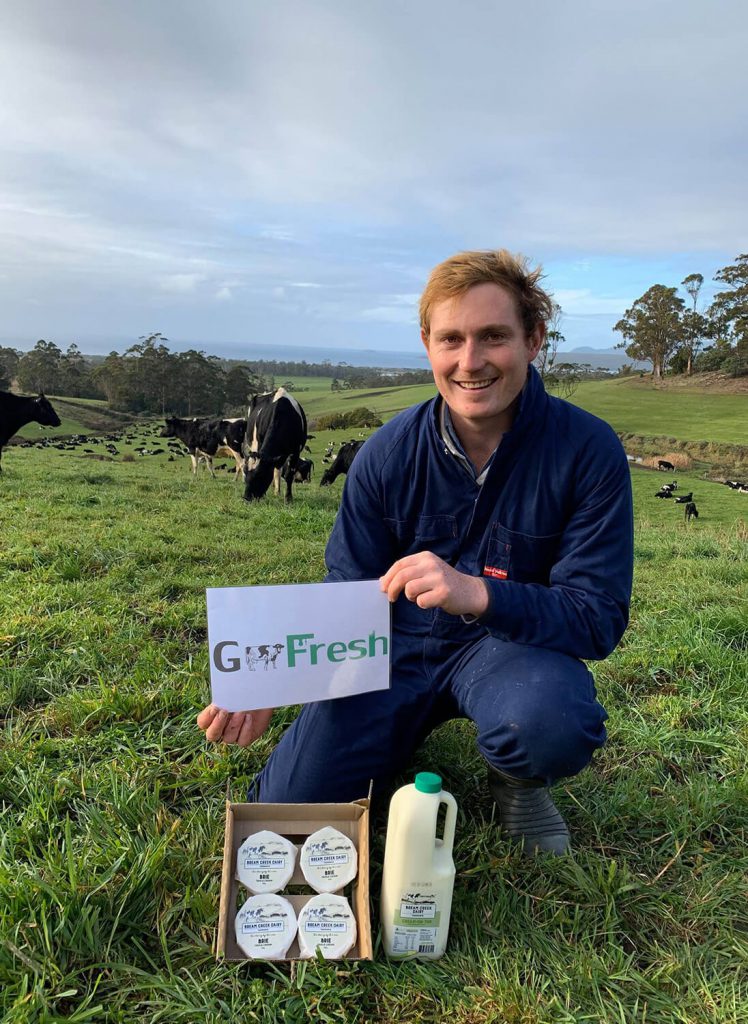
At only 24 years of age, Jack became the manager of a Dairy Farm that goes back three generations. And guess what? He’s loving it.
What does a Dairy Manager do?
A lot of time I’m supervising the milking of the cows, which we do twice a day. So I’ll get up at 3.30am, and we’ll do that till about 7.30, and then we’ll have breakfast. Then we’ll do the second milking at about 2 in the afternoon. The rest of the time I’m doing whatever else needs doing on the farm.
Had you always wanted to be a Dairy Manager?
No, my first thought was to work in the marine industry to be honest. So I got my coxswain ticket and I was planning on being the skipper of big boats. I thought I could make some good money. I worked on a super-yacht for a couple of months but after awhile I decided the boat thing wasn’t for me. So then I did some travelling around Europe for a while. Finally, I decided to go to New Zealand. That’s where I did my Science Degree in Agribusiness and Food Marketing. It was a three-year course.
So when were you offered the job as the Dairy Manager at Bream Creek?
In 2019. I was 23 at the time. The previous dairy farm manager was here for five years, and he decided he’d had enough. So the opportunity came up and I decided to give it a crack.
Did you feel a little daunted at the idea of managing the farm?
Definitely. But I’ve been fortunate to build some great relationships with all the vets. Also, the cow nutritionists down here. They love working with a young bloke who’s keen to learn about the industry. The farm is a family business so I’ve got my dad, uncle and mum to bounce stuff off, but they’ve encouraged me to be my own person.
Have you tried doing anything different with the management of the farm?
We’ve decided to develop our own products. So we’ve launched our milk brand with three premium varieties. We’ve also recently launched a range of cheeses. The thinking behind this is to give a bit more security and confidence for our business instead of selling all our milk to someone else.
What’s the best thing about being a Dairy Manager?
I’m so lucky to be working in such a magnificent environment. Lots of fresh air, working with beautiful Friesian cows. No two days are the same, and there’s always a challenge thrown at you. You’ve got to learn to be a bit of a plumber, an electrician, a mechanic, and a vet because there’s no one else around. You’ve got to work it out yourself.
What takes up most of your time?
We’ve got 800 cows at the moment. They weigh about 650 kilos each, so the management of their health is the biggest thing. So making sure they have the right mix of food, and that varies throughout the year. We’ve also got calving twice a year, in spring and autumn, and that’s pretty full-on. The calves need to be looked after. They’ll become replacements in the herd once the older cows stop producing milk.
What other types of jobs are there at a dairy farm?
There’s lots of harvesting we do with the tractors. There’s also ploughing, mowing, carting it up to the dairy, plus fencing maintenance. Every year, we also take on a couple of people for calf rearing. Right now, we have a local girl who is about to finish Year 12. She wants to come and work full-time with us and rear the calves. So there are plenty of opportunities.
Do you need to go to university to get into the dairy industry?
No. It depends on what you want to do. I did the Bachelor of Agribusiness and Food Marketing in New Zealand, like I said. But there are courses at the University of Tasmania in Applied Science that are very good. This allows you to take on more senior roles. But we’ll have work for casuals throughout the year. It’s pretty low-skilled work. Jobs like cleaning and washing of equipment, food mix preparation. We’re often battling to find people.
Is the dairy industry growing or shrinking in Tassie?
In Tassie it’s pretty good. Tassie is on track to have a record year for milk production this year. The farms are definitely getting bigger. This requires a higher level of education to manage.
What hard skills and soft skills have you found vital for this job?
I do a lot of computer work. Every individual cow has their own electronic ear tag. This tell us how many litres of milk each cow is giving us a day. So I.T. skills are very important for my role, as well as good communication skills.
What are some of the challenges of your job?
Looking after the staff. As I’m a young bloke managing the farm, some of the staff think they can get away with stuff a bit more. So they might be a bit slack or lazy sometimes. So dealing with people is hard – the cows are the easy part.
Looking back at your early school education, what life skills did you start to develop that you use now?
It’s amazing how much English and Maths come into daily stuff on the farm. You need to work out feed mix rations, pouring concrete. Or trying to write a business email. People aren’t going to take you seriously if you’ve got bad spelling and punctuation. Researching skills are also very underrated. In the last 12 months I’ve learned more stuff than ever. I like to drill down to the latest data and make sure I’m 100% convinced of what we’re doing.
What sort of roadblocks have you hit so far in your career? How did you feel at the time and how did you work around it?
One of the hardest things is being one of the few dairy farmers in this part of Tassie. We don’t have the services that the big clusters of dairy farmers on the north-west coast have. They can call a vet and they’ll be there in 5 minutes. If we call a vet, it might take a week. So we take on a lot of the treatment of the cows ourselves.
What advice would you give someone thinking of becoming a Dairy Farmer?
Get some experience, and test the water. We give a lot of casual work to backpackers throughout the year but employers would prefer to find someone local who is eager to learn.

Find out more
Explore careers in agriculture through the University of Tasmania’s Undergraduate Certificate in Agribusiness, Bachelor of Agricultural Science and Master of Agriculture and Food Sciences (Specialisation). These programs provide a strong foundation in crop and animal production, sustainable farming practices, and agribusiness management. Discover pathways to shaping the future of food security and sustainability while making a meaningful impact on rural and global communities.
Even while you’re still in school, you can begin building your future through Work-based Learning (WBL), School-based Apprenticeships (ASbA), and VET qualifications. These programs give you hands-on experience and real-world skills to prepare for a successful career in agriculture.
